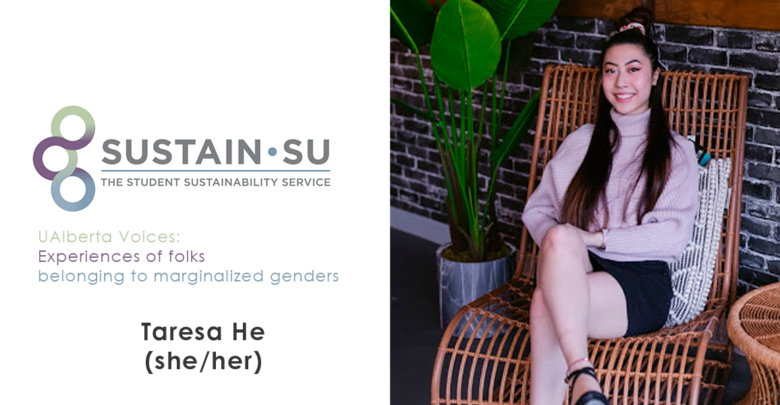Impacts of gender inequality on mental health within Chinese-Canadian Culture: a Q&A with Taresa He
 Pia Co
Pia CoThis guest column is written through a partnership with Sustain SU, a service provided by the University of Alberta Students’ Union. The interviews and articles have been conducted and written by Sustain SU ambassadors, and edited by The Gateway for publication.
This article is the second of a multi-part series named “UAlberta Voices: Experiences of Folks Belonging to Marginalized Genders“ that aims to highlight the experiences of students and community members belonging to marginalized genders in leadership positions within the University of Alberta campus and Edmonton community.
This is a question and answer (Q&A) session with Taresa He (she/her). Taresa explained the gender inequality that exists within the Chinese-Canadian culture, and its impact on mental health.
Interview responses are edited for brevity and clarity.
Q: Tell us a bit about yourself.
Taresa He [she/her]: My name is Taresa He, and I identify with the pronouns she and her. I am taking a year off from university, but I love staying busy by working two jobs. I teach martial arts, and I represented team Canada in many competitions. I am currently using my Instagram as a platform to raise awareness on mental health and I also do lifestyle blogging on it.
Q: What does mental health mean to you? For example, how do you practice self-care, stay connected with people?
He: Before, mental health did not mean anything to me because I didn’t have time for it. My parents had never talked about it and nobody talked to me about it. But, as the years went on, more of my mental health and stress and anxiety built on, and I never addressed it.
Last year, I had a huge mental breakdown that I had to go see a psychologist for and I went through three months of psychological treatment; that was when I realized: everyone should be putting their mental health first. It was such a dark time in my life; I can’t explain how hard it was, but it was difficult.
I was never the type to whine or cry about anything; I was always strong and had that “keep going at it” attitude. But my mental breakdown happened and I realized, “I need help”. So now I make sure I spend lots of time with people I love, having time for myself, doing things that I love, and having time to relax because I never did before.
Q: As an individual who comes from a Chinese background, how do you think the topic of mental health is treated in your culture?
He: Definitely not good. I don’t think mental health exists in the Chinese culture. I don’t remember my family nor my parents ever mentioning anything about mental health. Growing up, we were taught to: “Work hard, be grateful, and be appreciative, because happiness will automatically come when you have money” — that was the mentality — “you will be happy when you have money.” I’m sure there are lots of people in the world who are doctors, lawyers, and high-end engineers who are not happy.
I remember when I was a kid, when I told my mom I was upset about something, she yelled at me and said, “Why are you upset? There is food on the table, you have a roof over your head. You should be grateful, not unhappy because you have everything that a lot of people dreamed of.”
But that is not it, that is not what mental health is. In the Asian culture, I feel like everyone ignores mental health because they all have mental health issues or illnesses that they don’t want to address. I know this because my mom has a lot of childhood trauma. It was a rough time during the Chinese history; there was a war happening. A lot of people didn’t have money for food, so my mom at that time started working when she was eight years old, so she has lots of childhood trauma that she doesn’t want to address.
The Asian culture doesn’t believe in the existence of mental health because they are scared of it; they’re scared it’s going to attack them because they have issues with mental health themselves. Therefore, that is why there is stigma, and no one wants to address it.
Furthermore, when you address mental health, it is about change. Chinese people themselves do not like change, so that’s why they do not want to address it. Seeing a psychologist forces you to change by seeing things from a different perspective. At first, I thought you had to think in a straight line, but now, I am more open-minded, and I have started to see people from a different perspective.
Q: Do you think mental health is treated differently between genders in your culture?
He: It is definitely viewed differently between men and women. Men and women have a certain stereotype in the world. For example, the men must behave and act a certain way, and the same goes for women. Therefore, it is assumed that it is okay for women to be weaker, less dominant, emotional, so women can be mentally unstable because all we are going to do is cook and clean around the house, relying on the husband.
On the other hand, it is unacceptable for men to be what women stereotypically are because men are the supporting pillar of the household. Men are supposed to be strong, independent, and structured. However, based on an article from Mindwise, one in ten men experience depression and anxiety, and less than half go seek help just because of the stereotype: “men cannot be weak”. This is one of the reasons why men commit suicide more than women do. For women, they feel like they can go seek help because they are perceived as weak, but men cannot.
Men and women should be treated equally. Who says females must be less dominant and emotional? A female can be dominant, and a male can also be less dominant. Men can be emotional and should not be judged for it. A woman who is confident in herself should not be judged either.
Q: Are there any social norms (social pressures) in the Asian culture you would like to see being addressed?
He: The Chinese culture focuses on striving for harmony, collectivity, group, and family. My mom always told me, “Put the family first, don’t put yourself first. What would the family think? How can you provide better for the family?” Essentially, “Family is number one, we are number two.”
I feel like I owe my life to my parents because they did so much for me. They brought me to Canada to provide better education and life for me, and that is why I worked so hard for them, but never for myself.
I went to my first year of university for my parents, not even for myself. I was not ready to go to university and I wanted to take a year off. However, I had to think about my family, so I feel like this is what we need to address. A lot of Asian kids feel that they must think of the family first and do whatever is best for the family. But when are we going to put ourselves first?
We know how hard our parents work, so we must do things that are for the sake of our family because they worked so hard for us to do what we can today, so we have to do things to make them proud.
Q: What steps do you suggest for youth in Asian communities to take when approaching the topic of mental health to their families?
He: As an Asian person myself who has experienced this first-hand, firstly, it is important to know what mental health means to you, what kind of issues you have been going through and what you’re trying to do to cope with that.
For the youth out there who are afraid to confront their parents about this topic, think of it as a business proposal. You must plan, research, and be one hundred percent prepared before you propose to your supervisor. After gaining extensive knowledge about yourself, you must sit down with them and tell them what is going on. [You have to] reassure them that you are ok, but this is what is happening, but it is none of their faults.
My psychologist told me that even though a lot is from parent’s pressure, never say that to your Asian parents. In a way, it is a relief for parents to see you seeking support for your mental wellbeing, but it is hard for them to accept that their children are flawed. It will take time to digest, although parents will explode, it is important to let them know what is happening. All parents love their children unconditionally.
I also understand that going to the doctors can be uncomfortable because you have never met them before; it would be uncomfortable telling someone you don’t know about your life, and you would feel unconfident expressing yourself too.
Q: What do you think about the progress Asian communities are making in addressing gender inequality in their countries?
He: Asian communities are making progress, especially for the younger generation. In the Chinese dramas that I’ve watched, all of them have ladies who are strong women as the main character, and I feel like that is taking a step towards gender equality.
I was inspired by Wonder Woman. When the movie came out, many little girls were shown that girls can be superheroes too; girls can save the world too. The Asian Community realized that which I believe was why they did the live-action Mulan.
A lot of Chinese dramas have a strong Asian female main character. By seeing this on social media platforms, the younger girls and younger generation see that whatever men can do, so can women. It makes younger women feel more confident in themselves; it lets them know that men and women are equal.
I feel like the older generation is still stubborn about it. However, I know that the younger generation is more open about addressing gender equality. Similar to China, for the upcoming generation, gender equality would be better addressed.
Q: As a Chinese-Canadian, can you describe some gender stereotypes you have witnessed within the Chinese culture?
He: As an Asian person who has experienced this firsthand, I was told by my mother that I must marry someone who was rich. But I said, “How come I cannot be the rich one?”
My mother said, “That’s not how it works, men must be the rich one.” For females, some stereotypes are: being able to cook and clean, be emotional and show vulnerability, and lacking the self-confidence to seek support from men. For males, some stereotypes are: being the wealthy, educated, and structured one. In a relationship, men must be the supporting pillar and dominant one. However, from what I’ve witnessed, there are different dynamics in families.
For my mom, if men are not as dominant as women, men are deemed useless. Men must be like “this” and women must be like “that”, or else [she thinks that] there is something wrong… even when there is nothing wrong at all. Similar to occupations, women are supposed to be teachers, nurses, secretaries; things that are more mellow. Whereas, men can be doctors, engineers, lawyers; people who make decisions.
Q: How have these gender roles in Chinese culture influenced your way of thinking in life? For example, career aspirations, and mental wellness.
He: As an Asian female, we are classified into a specific bubble. If we go outside of it, there is something wrong with us. I’ve always been a confident girl, even when I was a kid. My parents never praised me for being confident, but they said I was cocky, and I should not be like that because it doesn’t make other people feel good. However, I thought to myself, “How about making myself feel good?”
My grandma always told me how to cook, clean, and sew; because that is what a woman does. These gender roles in the Chinese culture make us think that we can only act a certain way and choose specific careers. It is thought that there is no room for us women, but that is not the truth. We as women deserve to be where decisions are made. I am glad that the U.S. has a female vice president because it inspires many women to think that they are capable of aspiring to be like her. I feel like this is a huge step towards gender equality.
Q: What do you think is the most common reason why it is difficult for Asian women to address the inequality between Asian men and women?
He: I feel like it is because Asian women don’t believe that this inequality exists, just like mental health in Asian culture, which is why they do not address it. Confucius has always taught that Chinese men and women have certain roles, and this mindset is passed on generation after generation. If this isn’t changed within the education system, people will always believe men are different than women and each must do different things and these roles cannot be reversed. That is why gender inequality is not addressed in Chinese culture. Women do not address it because they believe there is nothing wrong with this way of thinking. These Asian women may also be scared to speak up because they are scared of what others may think of them.
Q: To end the interview, what are some encouraging words that you can give to empower other individuals who may also be struggling with something similar?
He: I will always say, “Women belong where males belong.”
We must be confident in ourselves, and we will attract the right people to support us. There are going to be people who will bring you down, people who are not confident of themselves, people who are jealous and are scared of you. If you are confident in yourself, no one and nothing can bring you down. You must trust yourself that whatever you want to do, you can make it happen.
Just because it is a male dominated occupation, that does not mean that females cannot hold that position. Similarly, just because it is a female dominant occupation, it does not mean that men cannot hold this position. It does not mean that you do not belong. Whatever you are passionate about, that is what you’re going to do the best in.
We dictate where we want to go in life; we cannot live in a world where we think in one way, where there is only one answer. Be open-minded on new things and be accepting. That is also another tip on mental health. You cannot think in one way, you should think from a different perspective, which will make your world a lot bigger.
Sustain SU Ambassador’s Note:
Addressing the United Nations’ Sustainable Development Goal #10: Reduced inequalities
Anti-Asian sentiment has been an issue even before COVID-19. Throughout the pandemic, there have been noticeably more hate crimes and violence against the Asian community. For example, new racial slurs have been created as alternative names for the coronavirus, and an increasing number of incidents of xenophobic attacks on various Asian ethnic groups, especially toward the elderly. As an Asian Canadian, society makes us Asians think that we are weaker than others and that we are pushovers. Although we are considered a visible minority, we should not be pushed around and be deemed weak just because of language barriers. To achieve sustainable growth within and among countries, we need to start addressing these inequalities and provide additional support to individuals who have experienced these different types of inequality.
This guest column is written by Sustain SU volunteers through a partnership with Sustain SU, a service provided by the University of Alberta Students’ Union. To learn more about Sustain SU or to get involved, visit their website.




